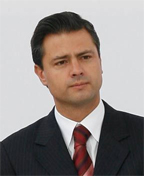Now, President Felipe Calderon’s National Action Party (PAN) is trying to use the same gangs as a quick fix for its fading hopes of re-election next year – by painting rivals for the presidency as corrupt and in the pockets of the cartels.
Calderon’s term in office has been dominated by a bloody conflict with drug traffickers that has claimed 45,000 lives, eroding support for the PAN and turning the drugs war into a make-or-break issue for July’s presidential elections.
Latest surveys show his party is headed for defeat. The PAN is trying hard to taint the image of its bitter rival, the centrist opposition Institutional Revolutionary Party (PRI).
Last month Calderon said some PRI members might consider deals with drug gangs, stirring up claims by critics of the opposition party that it made secret pacts to keep the peace in the 71 years it ruled Mexico until 2000.
And on Tuesday the office of Calderon’s attorney general said it was investigating whether a drug cartel pressured voters to back the PRI in a state election on Nov. 13.
John Bailey, a political scientist at Georgetown University in Washington, said Calderon had played a “double game” by calling for unity in the fight against organized crime – then suggesting his rivals were complicit with the gangs.
“Going negative is ugly, but it’s effective,” he said. “I don’t think Calderon has clean hands on this at all.”
But Calderon is well aware that most Mexicans want to root out drug gangs – and reject making deals with them.
Voters like Mayra Lara, a 29 year-old business manager in Mexico City, say they would have to think very hard before voting for a party that was allegedly colluding with criminals.
“How can you trust a government that supports drug traffickers, drug traffickers who are up to their necks in violence, recruiting young folk and the rest of it?” she said.
So far, the mud-slinging has not hurt the PRI’s main presidential hopeful, the telegenic former governor of the State of Mexico, Enrique Pena Nieto. Polls give the 45-year-old around twice the support of his nearest rivals.
Unless the PAN can make the mud stick to Pena Nieto or people close to him, it may not matter much in 2012 if the PRI’s reputation suffers, said Federico Berrueto, director general of pollster Gabinete de Comunicacion Estrategica.
“Pena Nieto is not seen as a traditional PRI politician,” said Berrueto. “And when it comes to the presidency, the party is less important than the person.”
DOUBTS ON DEMOCRACY
The closeness of the election in Michoacan two weeks ago made it ideal for raising the specter of foul play.
The western state has been ravaged by drug gangs and the PRI candidate for governor defeated Calderon’s older sister by just 43,000 votes – out of about 3 million eligible voters.
Then a tape was leaked to the Mexican media in which a man identified as a leader of local cartel La Familia said voters in his district had to back the PRI or face reprisals. It was not clear how the recording was made, or how it came into the hands of the media, raising questions about the evidence, said Javier Oliva, a political scientist at the National Autonomous University of Mexico (UNAM).

The man on the tape also stated the leftist Party of Democratic Revolution (PRD), which ruled Michoacan for the past decade, had ties with drug gangs. Hours after it was broadcast, the attorney general’s office said it would investigate.
The PRI leadership has denied cutting deals with drug gangs, but its record of corruption during the party’s long and often authoritarian hold on power has made it an easy target.
The end of PRI rule in 2000 is seen by many as the start of democracy in Mexico, faith in which has been tested during the drug war. A study published in October by pollster Latinobarometro showed only 40 percent of Mexicans felt democracy was the best political system. That figure was down 9 percentage points from 2010 and the lowest in Latin America apart from Guatemala.
Many Mexicans feel the war has infringed on their freedoms.
On Friday, human rights activists filed a complaint with the International Criminal Court in The Hague against Calderon, accusing him and other officials of allowing subordinates to kill, torture and kidnap civilians in the war.




